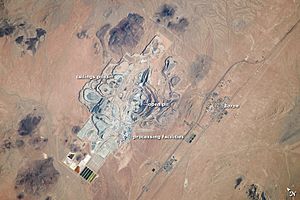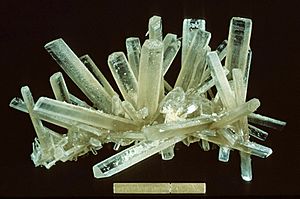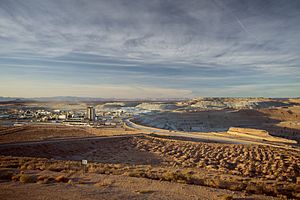Rio Tinto Borax Mine facts for kids


The Rio Tinto Boron Mine is a huge mine in Boron, California. It is California's biggest open-pit mine and the largest borax mine in the whole world. This mine produces almost half of all the borates used globally. It has enough borax to keep working for many years, well into the 2040s. The mine is run by the Borax part of the Rio Tinto Group.
Contents
The Amazing Boron Mine
The Rio Tinto Boron Mine is a very important place. It digs up a special mineral called borax. This mine is so big that it looks like a giant bowl dug into the ground. It helps provide a key ingredient for many things we use every day.
What is Borax?
Borax is a natural mineral. It is made of boron, oxygen, and other elements. People use borax in many different ways. It helps make glass stronger and more heat-resistant. It is also used in cleaning products, ceramics, and even some types of slime!
How the Mine Started
The story of the Boron Mine began over 100 years ago. It shows how a simple discovery can lead to something huge.
From Discovery to Big Pit
In 1913, a man named John K. Suckow was drilling for water. Instead of water, he found a white mineral. He first thought it was gypsum, but tests showed it was actually colemanite, a type of borax.
A famous person named Francis Marion "Borax" Smith bought the land. His company, the Pacific Coast Borax Company, started mining there. At first, they dug tunnels underground in the 1920s. Later, in 1957, they opened the giant open-pit mine we see today. An open-pit mine is a mine that is dug from the surface downwards, like a huge crater. The Pacific Coast Borax Company later became U.S. Borax. Today, the Rio Tinto Group owns and runs the mine.
A Look to the Future: Lithium
Mining companies are always looking for new ways to find valuable materials. In 2019, the mine started a special project. They began to look for lithium in the leftover rock from mining. Lithium is a very important metal used in batteries for phones and electric cars. This project shows how old mining waste can still be useful!
Visit the Mine!
You can learn more about this amazing mine by visiting its Borax Visitor Center. The center has a museum with old mining tools and interesting facts. You can also look out over the huge mine from a special viewing area. It's a great way to see how borax is mined and learn about its history.
 | Roy Wilkins |
 | John Lewis |
 | Linda Carol Brown |


